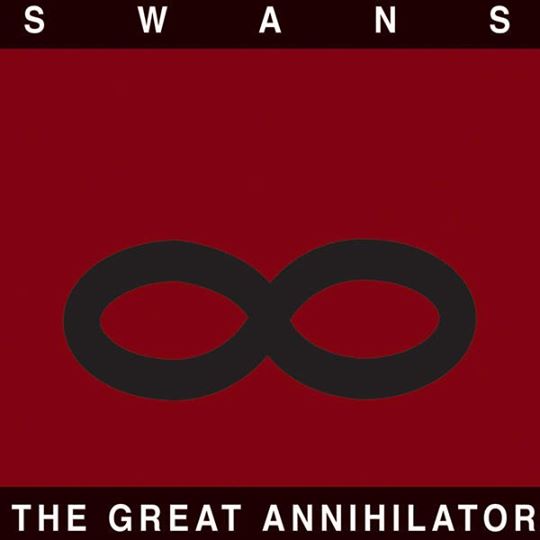(Young God, released Fri 5 May 2017 on vinyl, CD, and digital)
Reissues are tricky, and can coincidentally be summarised using the divisiveness of the recent Record Store Day releases: reissues are either a laudable effort to present an unearthed gem or a limited-run work to an audience who may not have heard it, or a cynical bid to monopolise on a band/album/single by presenting a product most audiences have already heard a million times, only this time on lurid picture disc (see here). At first, it’s unclear where on this scale The Great Annihilator, New Yorkers Swans’ reissued ninth album, sits. The previously mastered album today is critically acclaimed as Swans’ most accessible work, and is easily attainable through the usual outlets. But, as he stated in a press release, mastermind Michael Gira has long felt unsatisfied with the final mix of The Great Annihilator (and his contemporaneous solo outing Drainland, also included in this package) and his inability to invest time and money in rectifying its perceived shortcomings. While the reissue upon a cursory listen has a much bigger sound compared to the original, to say as much would only scratch the surface of this fascinating record of a transitional period in the group’s lifespan.
Gira and co’s earlier releases are reminiscent of heavy metal played at a slower speed, with appropriately grizzlier lyrics: sordid, vicious, and bleeding with catharsis. It seems apt that Swans’ extreme minimalism was to flourish in America, global capital of excess and consumption. However, as one of the longest standing groups of the short-lived no wave scene (a distinctly American anti-rock ‘movement’ that could only have taken off in New York), it’s strange just how European Swans sound on The Great Annihilator, albeit a sort of Americanized Europeanism. Though much of Swans’ sound certainly begins with the bleak post-punk of England (Joy Division in particular), the sense of scale on The Great Annihilator is enough to conjure, say, the stadium rock of Neil Young and Crazy Horse.
If Sonic Youth by their late career became alternative rock’s Kerouac – bohemian and cool, gazing wide-eyed at America from the back of a pickup truck – Swans are Burroughs – grotesque and paranoid, treading through the diseased bog beneath manicured lawns and white picket fences. For all the earth, soil, and sky in Gira and Jarboe’s lyrics, there’s no New Age universalism; only a theatrical pagan nihilism of bodily fluids and sacrifice rituals; of vengeful gods and dead children. It’s no coincidence that The Great Annihilator shares its name with a theoretical enormous black hole at the centre of the Milky Way. Gira plays an obscene pantomime villain à la The Wicker Man on I am the Sun, as he delivers verses like “I rise above the world / and when the light goes out / I kill another child” backed by the ghostly chanting of kids. Mother’s Milk sounds to any ear like a bloody British folk rhyme, as vocalist Jarboe sings “sweet is the sugar I’ll drink from your skull”. Jarboe sings a similarly gloomy story on My Buried Child, backed this time by the constant pounding of long ship drums. When American alternative music has historically had an unhealthy fixation with murderous cult leader Charles Manson – an emblem of celebrity’s darkest heart – Gira chose to ‘romanticise’ the Muswell Hill Murderer Dennis Nilsen on Killing For Company. The Great Annihilator sees Swans retreat from the American city to the most ancient forests of the pre-frontier, via the seedy suburbs of England.
The Great Annihilator also sees Gira somewhat midway through the lyrical disappearing act which would later characterise future releases. On 2014’s To Be Kind, opener Screenshot consists not of full sentences, but of stark, incantatory words (“Love! Now! Breathe! Now! Here! Now!”). There’s a touch of the same manic delivery on The Great Annihilator, especially with Mind/Body/Light/Sound’s strangely uplifting chorus, but for the most part these songs are marginally less obscure. Celebrity Lifestyle is bizarrely literal, almost sounding like a morose rock ‘n’ roll ditty, while She Lives, a tale of mental deterioration drenched in schadenfreude, is morbidly unambiguous.
The inclusion of “Swans related project” Drainland here as a companion album (for what is a black hole if not a giant cosmic drain?) may be something of interest to completionists. Indeed, listening to the both albums consecutively is an exhausting task not for the fainthearted. Drainland is a much uglier work full of unbidden dissonance, jarringly personal field recordings, and, strangest of all, country and western melancholy. A skeletal version of Where Does A Body End?, tantalizingly re-titled Where Does Your Body Begin?, appears on Drainland as a softer earthbound version of a song that once violently soared. The Great Annihilator’s track Alcohol the Seed deals with addiction and creativity (“I need alcohol / to open my blood / I need alcohol / to empty my head”); Drainland’s opening track You See Through Me contains what appears to be an argument about Gira’s boozing and money troubles in the form of a phone recording, backed by an Ennio Morricone-twinged instrumental. Real or staged, it sets up Drainland as the internal conflict raging within The Great Annihilator’s misanthropy.
This reissue package is an unexpected document of what Swans were and what they were to become in their post-2010 reformation. What Gira saw as the beginning of the end for Swans in 1995 (the live double album Swans are Dead would be recorded and released within the next three years) in fact sounds like sowing the seeds for the apocalyptic symphonies of 2012’s magisterial The Seer. Suffice to say, without The Great Annihilator, and to a lesser extent Drainland, Swans probably wouldn’t be terrifying and enthralling audiences the way they do today – and that can’t be a bad cause for a reissue.
